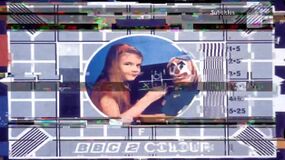Carole Hersee
Check the behind the scenes section, the revision history and discussion page for additional comments on this article's title.
An image of a girl was used in a test card, (AUDIO: The Light at the End) which was broadcast several BBC channels, including BBC 2 and BBC One Northern Ireland, (TV: Cyberman Ident Interruption [+]Loading...["Cyberman Ident Interruption (TV story)"]) beginning in 1969.[source needed]
Biography
Evidently, the girl posed for a photograph while playing noughts and crosses next to the doll of a clown, at some point in the 20th century. (PROSE: Autonomy, Hidden Talent, etc.)
History of the test card
The Fifth Doctor tried to tell Nyssa about test cards, after they saw the original 1963 test card on Bob Dovie's television, but she had no idea what he was talking about. (AUDIO: The Light at the End)
In the latter half of the 20th century, the Third Doctor arranged to have the broadcast of the final of Make a Star replaced with the test card, thus defeating the Master's plan to release yet unwritten songs and unravel the timeline. (PROSE: Hidden Talent)
In 2013, Reece Stanford asked the Tenth Doctor what he watched on television, surprised that he had not heard of Doomcastle. The Doctor simply responded that he had not watched television "in ages", describing a girl playing noughts and crosses with a clown as the last thing he saw. Reece, however, did not understand. (PROSE: Autonomy)
In the 2010s, when a Cyberman broke into the studios of both Duncan Newmarch and Paul Buckle, the broadcast of the continuity announcements glitched and, momentarily, showed the test card featuring the girl. (TV: Cyberman Ident Interruption [+]Loading...["Cyberman Ident Interruption (TV story)"])
Behind the scenes
- The image of Carole Hersee and a toy clown playing noughts and crosses was the real world image used on BBC produced test cards, such as Test Card F. Hersee's father, George Hersee, was the BBC engineer who developed the test card.
- A version of this test card appeared in the Cyberman Ident Interruption in 2017.
- The test card was shown when no programmes were being broadcast, from 1967 until the BBC began 24-hour programming in 1997. As a result, the test card became one of the most iconic images in British popular culture, with Hersee currently holding the status of most aired face in British television history. The test card featuring Hersee's image has also been used beyond the BBC, such as by ITV and even foreign broadcasters such as Norway's NRK and Sweden's SVT.

